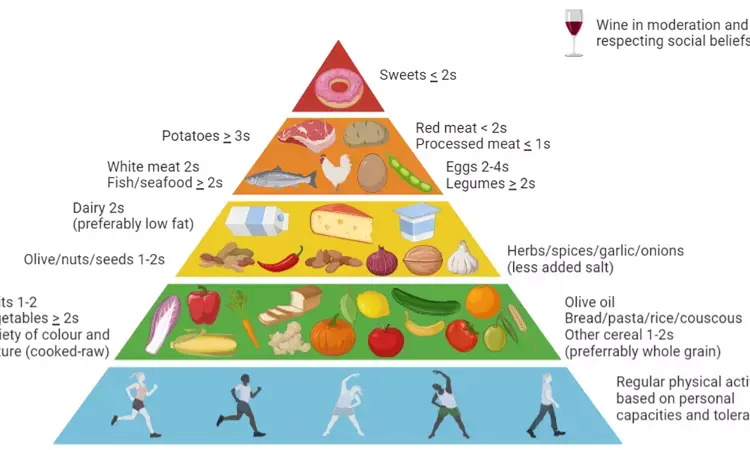- Home
- Medical news & Guidelines
- Anesthesiology
- Cardiology and CTVS
- Critical Care
- Dentistry
- Dermatology
- Diabetes and Endocrinology
- ENT
- Gastroenterology
- Medicine
- Nephrology
- Neurology
- Obstretics-Gynaecology
- Oncology
- Ophthalmology
- Orthopaedics
- Pediatrics-Neonatology
- Psychiatry
- Pulmonology
- Radiology
- Surgery
- Urology
- Laboratory Medicine
- Diet
- Nursing
- Paramedical
- Physiotherapy
- Health news
- Fact Check
- Bone Health Fact Check
- Brain Health Fact Check
- Cancer Related Fact Check
- Child Care Fact Check
- Dental and oral health fact check
- Diabetes and metabolic health fact check
- Diet and Nutrition Fact Check
- Eye and ENT Care Fact Check
- Fitness fact check
- Gut health fact check
- Heart health fact check
- Kidney health fact check
- Medical education fact check
- Men's health fact check
- Respiratory fact check
- Skin and hair care fact check
- Vaccine and Immunization fact check
- Women's health fact check
- AYUSH
- State News
- Andaman and Nicobar Islands
- Andhra Pradesh
- Arunachal Pradesh
- Assam
- Bihar
- Chandigarh
- Chattisgarh
- Dadra and Nagar Haveli
- Daman and Diu
- Delhi
- Goa
- Gujarat
- Haryana
- Himachal Pradesh
- Jammu & Kashmir
- Jharkhand
- Karnataka
- Kerala
- Ladakh
- Lakshadweep
- Madhya Pradesh
- Maharashtra
- Manipur
- Meghalaya
- Mizoram
- Nagaland
- Odisha
- Puducherry
- Punjab
- Rajasthan
- Sikkim
- Tamil Nadu
- Telangana
- Tripura
- Uttar Pradesh
- Uttrakhand
- West Bengal
- Medical Education
- Industry
Mediterranean diet beats low-fat diet for arresting kidney function decline among obese diabetics with CAD, suggests study

Mediterranean diet beats low-fat diet for arresting kidney function decline among obese diabetics with CAD, suggests a study published in Nutrition & Diabetes.
Type 2 diabetes mellitus (T2DM) is recognized an independent risk factor for chronic kidney disease (CKD). The precise contribution and differential response to treatment strategies to reduce kidney dysfunction, depending on whether obesity is present alongside T2DM or not, remain to be fully clarified. Our objective was to improve our understanding of how obesity contributes to kidney function in patients with T2DM and coronary heart disease (CHD), who are highly predisposed to CKD, to assign the most effective dietary approach to preserve kidney function. 1002 patients with CHD and estimated glomerular filtration rate (eGFR)≥30 ml/min/1.73m[2], were randomized to consume a Mediterranean diet (35% fat, 22% MUFA, < 50% carbohydrates) or a low-fat diet (28% fat, 12% MUFA, > 55% carbohydrates).
Patients were classified into four groups according to the presence of T2DM and/or obesity at baseline: Non-Obesity/Non-T2DM, Obesity/Non-T2DM, Non-Obesity/T2DM and Obesity/T2DM. We evaluated kidney function using serum creatinine-based estimated glomerular filtration rate (eGFR) and urinary albumin-to-creatinine ratio (uACR) before and after 5-years of dietary intervention. RESULTS: Patients with Obesity/T2DM had the lowest baseline eGFR and the highest baseline uACR compared to non-diabetics (p < 0.05). After dietary intervention, the Mediterranean diet induced a lower eGFR decline in patients with Obesity/T2DM, compared to a low-fat diet but not in the other groups (p = 0.014). The Mediterranean diet, but not the low-fat diet, also reduced uACR only in patients with Obesity/T2DM (p = 0.024). Obesity provided an additive effect to T2DM resulting in a more pronounced decline in kidney function compared to T2DM alone when compared to non-diabetics. In patients with concomitant presence of T2DM and obesity, with more metabolic complications, consumption of a Mediterranean diet seemed more beneficial than a low-fat diet in terms of preserving kidney function. These findings provide valuable insights for tailoring personalized lifestyle modifications in secondary prevention of cardiovascular disease.
Reference:
Podadera-Herreros, Alicia, et al. "Mediterranean Diet as a Strategy for Preserving Kidney Function in Patients With Coronary Heart Disease With Type 2 Diabetes and Obesity: a Secondary Analysis of CORDIOPREV Randomized Controlled Trial." Nutrition & Diabetes, vol. 14, no. 1, 2024, p. 27.
Dr Kartikeya Kohli is an Internal Medicine Consultant at Sitaram Bhartia Hospital in Delhi with super speciality training in Nephrology. He has worked with various eminent hospitals like Indraprastha Apollo Hospital, Sir Gangaram Hospital. He holds an MBBS from Kasturba Medical College Manipal, DNB Internal Medicine, Post Graduate Diploma in Clinical Research and Business Development, Fellow DNB Nephrology, MRCP and ECFMG Certification. He has been closely associated with India Medical Association South Delhi Branch and Delhi Medical Association and has been organising continuing medical education programs on their behalf from time to time. Further he has been contributing medical articles for their newsletters as well. He is also associated with electronic media and TV for conduction and presentation of health programs. He has been associated with Medical Dialogues for last 3 years and contributing articles on regular basis.


